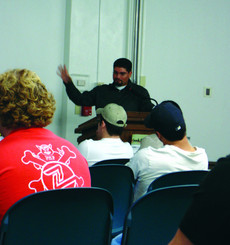Benjamin Prado spoke about how the government has enforced its border policies with Mexico concerning illegal immigrants at a guest lecture on campus Sept. 28.
Prado is a member of the American Friends Service Committee, a social welfare group started by Quakers in 1917.
“The reality is that we’re not co-existing with each other in a peaceful way,” began Prado. “This border has been marked by violence.”
Prado gave a detailed history of the United States’ immigration policies and early ideals of Manifest Destiny. Manifest Destiny is the idea that there was a god-given mandate to expand across the continent of North America and spread democratic philosophies.
This philosophy of expansionism led to the Mexican-American War of 1846-1848.
“The U.S. needs, or wants, to expand its territory, so we have a resolution,” said Prado. “The United States actually invade Mexico City and says either agree to give up more than half of your territory, or we will try to conquer Mexico.”
This led to the Treaty of Guadalupe Hidalgo, in which Mexico relinquished some 55 percent of its territory to the United States. This land included what are now Arizona, California, New Mexico, Colorado, Nevada and Utah. It also expanded the border of Texas south to the Rio Grande.
“The relationship is one born out of conflict,” said Prado.
The U.S.-Mexico border has become even more of a hot topic in recent years. But there has always been much debate over what to do regarding this stretch of land, which spans 1,951 miles and four states from San Diego, to Brownsville, Texas.
It is the busiest international border in the world, seeing some 350 million people cross each year. And those are just the ones that are recorded.
According to the U.S. Border Patrol’s official Web site, around 1885 Congress began to enact laws restricting the number of immigrants allowed into the country, particularly Chinese immigrants.
These immigration policies began due to fears of the U.S. labor force becoming flooded with immigrants who would work for much cheaper than the average American would, very similar to the justifications used in today’s climate.
“These restrictive immigration policies caused more people to attempt to cross into the U.S. illegally,” Prado said.
Prado said that gave rise to the creation of the U.S. Border Patrol on May 28, 1924.”
There are many groups on both sides of the fence who would like to see their own agendas in place regarding the border. Those with the greatest potential impact, the United States and Mexico governments, tend to take a more distanced approach to the issue.
The U.S. government’s idea of fixing the problem, since the creation of the Dept. of Homeland Security, is to build and expand the border fence and increase the amount of border patrol agents, Prado said.
“We saw an increased militarization of the border around the same time as the enactment of NAFTA, which was supposedly dissolving borders in North America,” he said.
The Mexican counterpart to the border patrol serves a different function than to merely try and prevent illegal crossings. They give information to people trying to cross the border to help them survive the journey. They provide tips on avoiding bodily harm due to exposure from crossing the desert and give them places to go once they make it across.
A better way to stem immigration, Prado said, might be to focus on improving living conditions in the places where these immigrants are coming from, rather than trying to make it harder for them to come here, or making it worse for them when they do come here.
In his lecture, Prado stated that some of these implementations of border policies have actually worsened the problems of immigration.
“The human trafficking phenomenon was created – was a by-product – of policies that were put into place to stop people from coming across,” Prado added. “Before there was circular migration. People would come, work a couple of months, then go back. As a consequence of Operation Gatekeeper, the sealing off of this border, more people now couldn’t go back and forth freely, so they must bring their families here too.”
The United States has passed numerous laws over the past 15 to 20 years criminalizing the illegal immigrants and anyone who helps or hires them.
“Here in California, Proposition 187 was passed in 1994 denying illegal immigrants any social services, healthcare and education for their children,” Prado said.
Proposition 227, which voters passed overwhelmingly in 1998, was basically a mandate limiting bilingual education and making English the official language to be taught in schools.
Partly as a result of these laws, Mexicans now form 35 percent of the California prison system population. Prisons have taken advantage of this with prison work programs, which encourage prisoners to work for as little as 38 cents to 45 cents per hour. They do a varying range of jobs, from stitching clothes for popular brands such as No Fear, to telemarketing for companies like AT&T.

